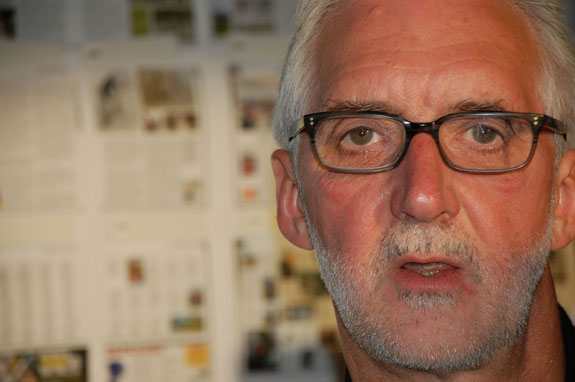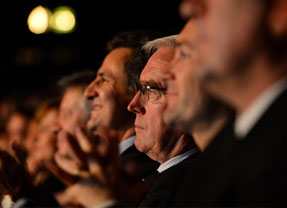On the final weekend of August 2013, Brian Cookson visited Sydney and attended a Cycling Australia board meeting. The 62-year-old is one of two candidates for the roll of president of the UCI. He has been an administrator in cycling for over 15 years and has been president of the British Cycling Federation since November 1996.
RIDE Media’s publisher Rob Arnold caught up with Cookson on the day it was announced that Cycling Australia would be endorsing him rather than the other candidate, Pat McQuaid, who has held the position of president of the UCI since 2005.
In an interview that lasted over 50 minutes, Cookson presents his argument about the need for change in cycling and outlines some of the processes he believes are necessary to undertake for cycling to prosper.
We will broadcast the interview as both Soundcloud audio files as well as a transcript on ridemedia.com.au as we approach the election date. Here is the transcript for part one, of RIDE‘s discussion with Brian Cookson…
Part 01 | Part 02 | Part 03 | Part 04…

Brian Cookson interview (26 August 2013)
– By Rob Arnold
RIDE: The light is on, we’re recording but please feel free to talk openly. What we want to do is understand the premise of what’s going on. And like we were alluding to [earlier] is that there is so much politicking going on that we’re losing the ability to administer the sport. Or not?
Brian Cookson: “That’s not my choice. My choice was simply to produce a manifesto, to put it out there, to be a credible alternative and hopefully to have a debate with the incumbent [UCI] president and all the rest of it. But what seems to have happened is that we’ve got embroiled in a bit of a personality issue largely as a result of what I see as unfair manipulation of the election process.
“To me it’s very, very clear: in the constitution it says ‘candidates shall be nominated by their federation’. Well, Pat [McQuaid] is Irish. I’m British. I’ve got my nomination [and] I made sure it was submitted in the right format at the right time.”
RIDE: And you’ve been [at British Cycling] since 1997, is that right?
Cookson: “What happened is that I took over when we had a vote of no confidence in our board at the end of 1996 because there were all sorts of problems and it was a pretty fraught situation and 10 of us were elected from the floor at our annual meeting and, because I’d been one of the most outspoken, they asked me to be the chairman and that subsequently got me the [roll of] president and we set about rebuilding British cycling. We took it from a position where we had… well, a) We were close to bankruptcy and we had a poor reputation, and b) We were in danger of losing our funding from government and so on.
“We had around 13,000 members and a turn-over of less than one-million pounds and we had one Olympic gold medal in 72 years which was Chris Boardman in 1992 at Barcelona [the individual pursuit]. From there we managed to establish a pretty good strategy and establish ourselves as a stable and bankable organisation – a fundable organisation. We had some success once we started to get things organised properly. We got a good strategy together.
“Success bred more success, bred more investment and so on… things turned around quickly and it began when we got the gold medal in the ‘kilo’ at the Sydney Olympics in 2000 with Jason Queally: it took him one minute 1.035 seconds, I think… [actually 1:01.609] and in that time the whole belief in ourselves at the British Cycling Federation changed and the whole ethos around the Manchester velodrome changed. People understood what it was and why it was there and why it was a good thing to fund – and that was a transformational moment.”
RIDE: You started with 13,000 members. And now, roughly…?
Cookson: “Now we have just short of 80,000. We have grown by 50 per cent since Bradley [Wiggins] won the Tour last year. One hundred new clubs have formed and participation levels are going through the roof. Even outside membership – in terms of people regularly riding their bikes and so on – are up at levels never been seen in the UK for decades and decades.
“It’s a real boom time for us.
“Only two weeks ago I attended a launch with the British prime minister, with Chris Hoy, Vicki Pendleton, Jody Cundy – one of our paralympians – and a lot of kids doing ‘Go Ride’ stuff and a group of women, what we call ‘The Breeze Network’… so we’ve got a lot of initiatives going on. And the prime minister wanted to be part of that and to launch his 90-odd million pound for investment in infrastructure for cycling program… you can always do better, always do more, but the interesting point is that everybody wants to be a friend of cycling.
“Only a week before that, I was on the start line of the ‘Ride London’ 100 miler with Boris Johnson, the mayor of London, and as I say the whole point now is that everyone wants a bit of the spoils of the pastime of cycling in the UK. That’s a good thing.”
RIDE: Come on aboard, let’s all get on the bandwagon… it’s a buzz.
If you’re in charge of something so successful does it give you hestitation to think about the UCI because the UCI is… it’s not to say that it’s not successful but it’s definitely tarred with many brushes, isn’t it?
Cookson: “It’s a very parallel situation, I think, in that when I first got involved in leading and transforming British cycling we were in a very difficult situation, as is the UCI now. We had a very poor reputation, as does the UCI now. So I think I’m reasonably well placed to identify what you need to do to get out of that situation.
“I have to admit that six months ago, I didn’t… it wasn’t on my personal agenda. My ambition was not to become president of the UCI. In fact, I’d just retired from my day job because I’ve always had a job that paid my salary and paid my mortgage and fed my family…”
RIDE: And what was that?
Cookson: “My original profession was landscape architect/urban designer. I spent the last half of my career in senior, director level, management in local government running economic development, planning, housing development, transport, highways, in a local authority in the north of England – managing partnerships with private sector, with service deliverers… and so on.
“So I think I’ve got a reasonably wide range of experience in that kind of thing, and a good understanding of politics and the political process, if you like, and the democratic process that I think is lacking elsewhere in the UCI.
“But the commitment that I’ve put in over the last 16 years while presiding in British cycling, I think, is a useful parallel one to what’s going to be needed with the UCI. I think there is a fundamental flaw in the way that the UCI is currently managed.
“There’s no understanding of the difference between governance and management – those are two different things and we’ve got still an emperor model of both things… the president is, in effect, the chief executive as well and, frankly, in the modern world that doesn’t work. In an international body, especially, it doesn’t work because we have different expectations around the world of what a president should be, what checks and balances need to be in place between a management team and a board. That’s the same if you’re a multi-national corporation or a multi-national sports body. And I just don’t think that some of the people in the current administration… certainly Pat doesn’t understand why that is an issue, why people can criticise the UCI on those grounds.
“It is that separation between executive function and governance function that I think is absolutely critical to a big organisation like the UCI.
“And you see that manifest itself most seriously in the way it handles doping issues.
“The doping function is just down the corridor from the president’s office, from the chief lawyer’s office… and, even if there is no meddling and interference, in reality the impression given is that there is the potential for that. That’s one of the reasons one of my main planks is to have a genuine separation of the anti-doping function in cycling, [making it] entirely impartial and independent of the UCI.
“The UCI will still have responsibilities in delivering what the anti-doping body produces but to have that separate function is, I think, absolutely critical.”
RIDE: Much like the FFC – the French cycling federation and the…
Cookson: “And the AFLD, yeah. Absolutely. And now there are national anti-doping agencies in most countries, certainly there’s UK anti-doping, Australia’s got one as well… where that function is separated from the sports bodies. The bodies that are responsible for developing and delivering the sport, need to be separate from the bodies that are policing the sport especially in that specific activity which is fraught and full of danger.
“Our sport, cycling – particularly in road racing – has a history that is far from glorious and so it’s absolutely essential that we deal with that and get rid of all those allegations of conspiracy, cover-ups and so on which have never been properly addressed and make sure that we have a new structure that doesn’t allow those kids of possible conflicts to arise in the future.”
Part 01 | Part 02 | Part 03 | Part 04…
* * * * *




